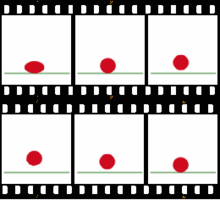Portal:Animation

Introduction
Animation is a filmmaking technique by which still images are manipulated to create moving images. In traditional animation, images are drawn or painted by hand on transparent celluloid sheets (cels) to be photographed and exhibited on film. Animation has been recognized as an artistic medium, specifically within the entertainment industry. Many animations are either traditional animations or computer animations made with computer-generated imagery (CGI). Stop motion animation, in particular claymation, has continued to exist alongside these other forms.
Animation is contrasted with live-action film, although the two do not exist in isolation. Many moviemakers have produced films that are a hybrid of the two. As CGI increasingly approximates photographic imagery, filmmakers can easily composite 3D animations into their film rather than using practical effects for showy visual effects (VFX). (Full article...)
Selected article
Machinima is the use of real-time 3D computer graphics rendering engines to create a cinematic production. Most often, video games are used to generate the computer animation. Originally, these recordings documented speedruns—attempts to complete a level as quickly as possible—and multiplayer matches. Machinima has advantages and disadvantages when compared to other styles of filmmaking. Machinima can be filmed by relying on in-game artificial intelligence (AI) or by controlling characters and cameras through digital puppetry. Scenes can be precisely scripted, and can be manipulated during post-production using video editing techniques. Editing, custom software, and creative cinematography may address technical limitations. Game companies have provided software for and have encouraged machinima, but the widespread use of digital assets from copyrighted games has resulted in complex, unresolved legal issues.
Selected image

Did you know (auto-generated) -

- ... that although Blizzard's franchise Overwatch is centered around video games, its lore is mainly told through animated shorts, comics, and novels?
- ... that the first lady of the Ivory Coast created an animated kids' show in 1989?
- ... that at age 12, Shaylee Mansfield became the first deaf actor to be credited alongside the voice actors for a signed performance in an animated production?
- ... that The Book of Virtues inspired PBS's first animated primetime series?
- ... that the creators of the cartoon Jade Armor filmed live-action martial arts stunts to visualize the show's animated action sequences?
- ... that, for the animated film Us Again, director and writer Zach Parrish considered a video of an elderly couple dancing to be visceral and ideal inspiration?
Selected quote
Selected biography
Isaac Lee Hayes, Jr. (1942-2008) was an American Grammy Award and Academy Award winning soul and funk singer, songwriter, musician, record producer, arranger, and actor. Hayes was one of the main creative forces behind Southern soul music label Stax Records, for which he served as both an in-house songwriter/producer and later as its premier recording artist. In addition to his work in popular music, Hayes has also written scores for several motion pictures as well. His best known film score, for the 1971 blaxploitation film Shaft, earned Hayes an Academy Award for Best Original Song (the first Academy Award received by an African-American in a non-acting category) and two Grammy Awards. Hayes received a third Grammy for his 1971 album Black Moses. In 1992, Hayes was crowned an honorary king of Ghana's Ada district thanks to his humanitarian deeds. From 1997 to 2006, he provided the voice for "Chef", a singing ladies' man and elementary school cook, on the animated sitcom South Park. There are conflicting statements from Hayes' publicists and others as to why he left the show, and this controversy is satirized in the South Park episode, "The Return of Chef".
Selected list
There have been 131 episodes of Ed, Edd n Eddy, an animated comedy television series created by Danny Antonucci and produced by Canada-based a.k.a. Cartoon. The series debuted on Cartoon Network in the United States on January 4, 1999, and ended on November 8, 2009, with the film Ed, Edd n Eddy's Big Picture Show. The series was originally planned to air for four seasons, but Cartoon Network ordered two additional seasons and three holiday-themed specials as a result of its popularity. Reruns continue to air on Cartoon Network, including airing as part of the revived block Cartoon Planet. The first two seasons were released on DVD in 2006 and 2007. Two DVD volumes were also released: Edifying Ed-Ventures in 2005 and Fools' Par-Ed-Ise in 2006. The series has also been digitally distributed. The award-winning series garnered generally positive reviews, and remains the longest running original Cartoon Network series and Canadian-made animated series to date.
More did you know...
- ...that the animated sitcom Home Movies switched to Flash animation for its second season?
- ...that the Rugrats episode "At the Movies" introduced the character of Reptar, who became a heavily recurring character throughout the series and the basis of countless merchandising tie-ins?
- ...that the Burka Avenger is Pakistan's first animated female superhero?
Anniversaries for January 3
- Films released
- 1927 – Horse Play (United States)
- 1936 – Vim, Vigor and Vitaliky (United States)
- 1942 – Hop, Skip, and a Chump (United States)
- 1948 – Gorilla My Dreams (United States)
- 1953 – Don't Give Up the Sheep (United States)
- 1958 – Happy Go Ducky (United States)
- 1965 – Ah, Sweet Mouse-Story of Life (United States)
- Television series and specials
- 1980 – Spider-Woman, an American animated television series based on the Marvel Comics character Spider-Woman finishes airing on ABC
- 1989 – Babar, a Canadian animated television series begins airing on CBC Television
- 2013 – Generator Rex, an American animated television series finishes airing on Cartoon Network
Subportals
Related portals
Wikimedia
The following Wikimedia Foundation sister projects provide more on this subject:
-
Commons
Free media repository -
Wikibooks
Free textbooks and manuals -
Wikidata
Free knowledge base -
Wikinews
Free-content news -
Wikiquote
Collection of quotations -
Wikisource
Free-content library -
Wikiversity
Free learning tools -
Wiktionary
Dictionary and thesaurus





















